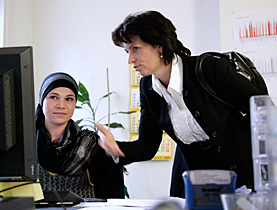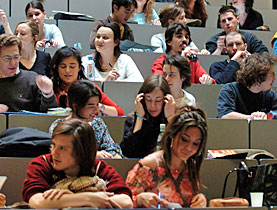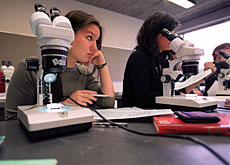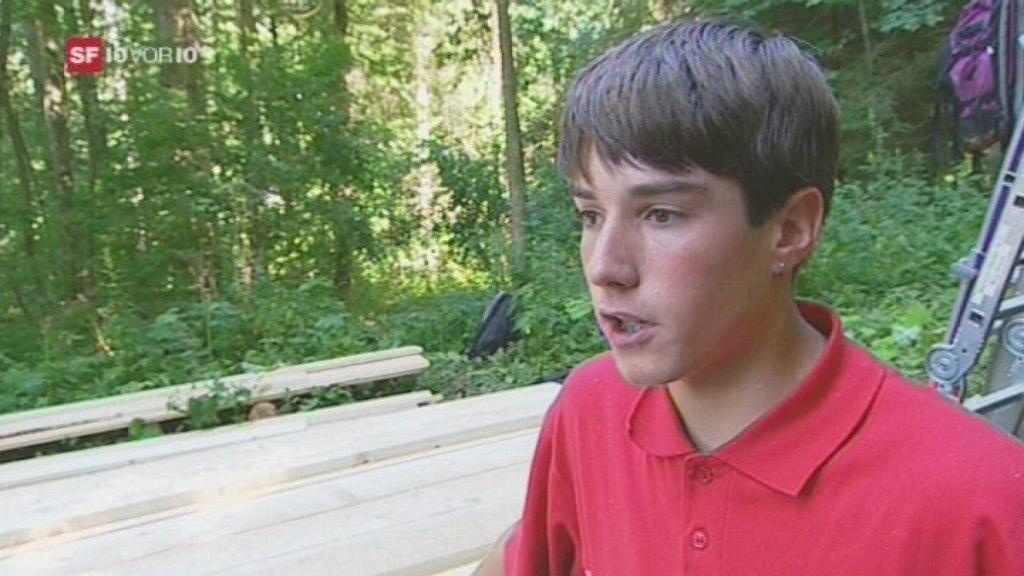Bologna accord adds to university challenges

Problems persist in the Swiss university system ten years after the adoption of the pan-European Bologna education accord, a survey has shown.
Around 5,350 Swiss students were questioned in 2008 for a national survey of how the Bologna agreement was affecting their studies. It is the first study of its kind on the issue in Europe.
Switzerland became a signatory in 1999 of the accord, which created the European Higher Education Area in a bid to unify academic degree standards and quality across the region.
The study by the Swiss Students Union (Unes) and Swiss association of higher education students offers a snapshot of modern student life and has found most students are satisfied with their university courses but weaknesses remain.
Overall, 74 per cent of respondents said they were happy or very happy with their training. Another 80 per cent described the structure of their studies as good or very good.
When questioned on potential problems in the make-up of their courses, more than 40 per cent said certain obligatory modules were useless and 30 per cent said their course modules were too rigid and did not give them the flexibility needed to juggle university and working life.
On a social level, old problems remain. Students from families with a lower educational background are still underrepresented. Unes said this was due in part to the absence of a system of grants in Switzerland.
Action plan
“The problems related to the equality of opportunities, of free access to higher education, to the compatibility between studies and work and the equality of men and women are certainly problems that date back before the Bologna accord, but the results unfortunately do not show any improvement,” said Unes, in the study results published on Wednesday.
Nor has the European Credit Transfer and Accumulation System that should ease movement between universities become a reality. Different rules between institutions have made assessing work difficult.
“Too often it is reduced to a simple calculation of credits and does not function coherently. If movement is the main objective [of the accord], it follows that these problems have to be eliminated,” said Unes.
The Rectors Conference of Swiss Universities, the umbrella higher education organisation, said it would be focusing on three areas of concern as a result of the study.
First off, the movement of students between universities needs to be improved by breaking down barriers such as different admissions procedures. Secondly, a new culture of teaching needs to focus on so-called “learning outcomes”, or life-long competencies that are valued under the accord. And lastly, flexible study programmes need to be created to ensure equal opportunities for all.
Switzerland has been quick to implement structural changes to meet the accord, namely by providing the two basic bachelors and masters degrees required by each signatory country, but still has work to do towards revising degree content.
More specifically under the accord the basic components of courses need to be adapted more towards learning outcomes – acquired competencies that can be used throughout life, rather than simply acquired knowledge.
New paradigm
Aline Burki, general secretary of Unes said the study showed Switzerland was having problems putting this into practice.
“Until now teaching in higher education has centred on the content. With the Bologna accord it changed to centre on teaching the student and on the wider competencies that this person acquires,” she told swissinfo.ch.
“That means we will no longer evaluate the themes covered but what the person has succeeded in retaining, competences that this person will be able to mobilise for the rest of his life.”
Unes and the Rectors Conference say a new “paradigm” in teaching is needed to ensure these changes are followed through.
For Sabine Felder, in charge of coordinating the implementation of the Bologna accord by the umbrella Rectors Conference of Swiss Universities, the overall results of the survey are positive.
“The Bologna process was developed ten years ago. Switzerland was quite quick to adapt to the system on a structural level. Now we must also change the content;” she told swissinfo.ch.
She said lifelong learning was very important in the European context and this study showed that there was work to be done there.
“All Europe is in the process of developing this change [of paradigm]. It is no longer the form of education that is important, rather the results that are of interest.”
Jessica Dacey, swissinfo.ch
74% of respondents are happy or very happy with their training. 10% were very or somewhat disappointed.
80% say the structure of their studies is good or very good
64% have ideal or very good standards of living
49% of respondents lived at home, 5% in university dorms, 2% lived with their children, 27% lived in shared apartments and 11% lived alone.
72% had regular or part-time work.
14% had student grants
76% wanted to do a masters (20% were unsure)
63% said they would transfer to do part of their course at another university. 37% did not have a chance to do a study exchange elsewhere.
24% of students who studied abroad experienced problems getting credits for the work in their original university, of which some followed the European Credit Transfer and Accumulation System.
40% say certain obligatory modules are useless
30% say their course modules are too rigid
The questionnaire was formulated by the Swiss Students Union and Swiss association of higher education students. There were 96 questions.
The questionnaire was opened to 11,268 students who had registered for bachelors or masters degrees in the autumn of 2007 in Swiss universities.
There was a 47% response rate, with 5,350 completed.

In compliance with the JTI standards
More: SWI swissinfo.ch certified by the Journalism Trust Initiative






You can find an overview of ongoing debates with our journalists here. Please join us!
If you want to start a conversation about a topic raised in this article or want to report factual errors, email us at english@swissinfo.ch.